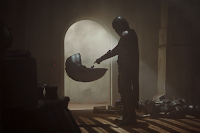Look, taking all the requests and granting wishes in the holiday season.
A few weeks back a friend of mine from the Burbank Writers Coffeehouse (and hey, have you bought anything from Dark Delicacies during this rough time?) asked me about when you begin a story. To use his example, if 98% of my story takes place on Mars, but we need to know just how our protagonist got to Mars… what do we do? Do we start on Mars and do flashbacks? Do we start on Earth and have a slow burn to our main story on Mars? Where does the story actually begin?
I’d been mulling over how to answer this for a few days when I sat down with my partner to watch a Christmas movie or three. And one of them had…a lot of beginnings. It had a frame story. Then an introductory story. Then we jumped ahead a couple years to (I guess) the main story. And each new beginning forced us to ask is this when the story starts…? And if so, what was all that earlier stuff for?
So, hey… let’s talk about beginnings.
First and foremost, this is all going to be kind of vague and loose. Not in a hand-wavey “don’t think about it” way, but just acknowledging the fact that every story is going to have different needs. If I (or anyone else) tried to set down a hard rule for “always begin here” we could all come up with a dozen or more well-known examples that break that rule. Every story (and every writer) is unique, which means every starting point is unique.
That said…
One of the first things we should be clear about is that “where to begin” is a structure question. We have the linear structure of the story—A to B to C to D—but we also have the narrative structure, the order I’m choosing to tell this story to my audience. A lot of the time A is an acceptable starting point, but it’s not uncommon to start at B or maybe even D. It depends on what I’m trying to do as the writer, and being able to recognize that telling a story in a different way creates a different story.
Second, there’s one or two things we can say with a lot of certainty shouldn’t be my starting point. I talked a while back about the problems a lot of prologues have, one of the big ones being that describe-and-die thing that tends to show up in a lot of B-movies. Not saying these things will never, ever work as beginnings but… wow, it’s going to be a tough hill to climb, y’know?
Third, I should really be clear when things happen in a story has a lot of bearing on how we receive those things. Doing this now looks brave, while doing it then just highlights my cowardice. Putting this here is somewhat interesting, putting it there makes people shriek with excitement. There’s probably a whole post’s worth of stuff in that to discuss, but for now I just need to consider what this starting point is (or isn’t) doing to some of these first bytes of information I’m giving my reader.
Fourth is kind of the unspoken one under all of these. I can’t really figure out a good starting point until I’ve got a story more or less assembled. It might not be written out in full, but I should have at least a rough sense of my plot and story. Maybe it’s a rough outline or just a good set of character ideas and plot points in my head. I can’t decide where to start telling my story if I don’t have a story, right?
I think this step trips some folks up. They come up with a cool opening, or they want to mimic the structure of a cool opening they saw somewhere else, but ultimately this opening doesn’t work for the story they’re trying to tell. It might be the coolest hat ever, but it just doesn’t go with this outfit. And if I keep insisting it does, I won’t notice that my little Kangol cap would go perfectly with that tie and really help bring out some subtle colors in the jacket.
(writing tips and fashion tips!)
But all of this still leaves us trying to figure out what makes a good starting point. Again, it’s tough because our stories are all going to be unique to us. I can’t really say “do this” and think it’s going to work for… well, maybe for any of you.
So here’s two thing to try.
Thing One—look at that rough draft or outline or framework and just lop off the first chapter (or its equivalent). Whatever you were thinking of using as a starting point, go past it and start there instead. As I mentioned above, a lot of us develop bad storytelling habits because we got hit too many times with the “start with action” stick. So our gut reaction is to create an artificial starting point that has a boxing match or a car chase or a two-headed shark attack.
And a lot of the time, if I snip off that artificial opening, what I’m left with is still a very solid opening—usually a better one. It gets me right to my characters. It gives me a stronger dramatic structure. It works better for reveals. Does it always work this way? Not always, but a surprising amount of the time… maybe 83%…
Thing Two—I’ve mentioned the idea of an elevator pitch before. Lucky me, I’ve just ended up in an elevator with a high-powered Big Five (is it Big Four now?) editor. So I’ve got one, maybe two sentences tops, to tell them my story and get them interested. No run-ons or rambling. I’m going to get three breaths, tops.
Do that right now—how would you pitch me your story in one sentence? Yes, now I’m the high-powered editor. Surprise twist!
Where did you start your pitch? Did you skip over anything? And if something wasn’t important enough to mention in the big sales speech… does it need to be there?
And in both of these, please keep in mind I’m not saying I won’t ever need these bits I’m cutting loose in my story. They might be things to come out in backstory or flashbacks. I’m just saying maybe I don’t need to start my story with them.
Next time…
Holy crap. Next time is Christmas Eve. I’ve got to get these last few cards in the mail. And wrap stuff.
But maybe next week, as we’re all settling down for our long winter’s nap, we could talk about something seasonal.
Like Die Hard.
Until then, go write.








